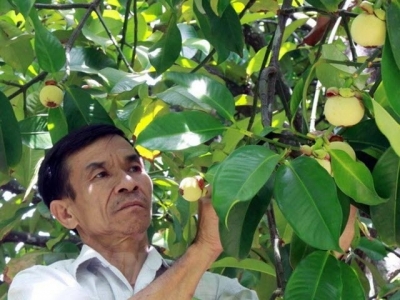For southern farmers, mangosteen no longer pays

A farmer in Bến Tre Province in the Cửu Long (Mekong Delta) tends to his mangosteen tree. — VNA/VNS Photo Dương Ngọc
BẾN TRE — Though he has grown and sold mangosteen fruit for 20 years, Lê Văn Sơn of the Bến Tre Province in the Cửu Long (Mekong) Delta has gradually removed the trees from his orchard over the last two years.
The 0.6ha formerly filled with mangosteen has been replaced by durian and mango trees on his 1.2ha orchard in Chợ Lách District. Sơn said he made the right choice.
“I used to make VNĐ15 million (US$655) a year selling mangosteen fruit. But crop failures in the past three years halved my earnings from the fruit to only VNĐ7 million ($306) per year,” he said.
Having earned VNĐ1 billion ($44,000) from selling fruits from 100,000 durian and mango trees in the past two years, Sơn said he might get rid of his mangosteen trees altogether.
“Mangosteen has helped put food on our table for a long time, but it seems to have become outdated,” he said. “I’m thinking of removing all the mangosteen trees from my orchard.”
Many farmers in Bến Tre Province have stopped growing mangosteen due to its low economic efficiency, though the fruit being one of the province’s five fruit specialties, Thanh Niên (Young People) newspaper reported.
A historic saltwater intrusion that affected the province in 2016 is blamed for the situation.
“Our mangoteen crops kept failing after that,” said Nguyễn Văn Thùy, a farmer in the province’s Vĩnh Hòa Commune. A month ago he decided to cut off 3,000sq.m of mangoteen trees that he had been growing for 30 years.
“I couldn’t take it anymore and decided to switch to growing flowers,” Thùy said.
Switching from mangosteen to other types of fruits and flowers causes farmers trouble because they are not familiar with the new crops and unsure who to sell them to.
But since mangosteen takes about five years to bear fruit, the farmers’ decision is basically irreversible. It would take years before they can start earning money again, if they want to get back into the mangosteen business.
Trademark infringement is another factor that discourages farmers from growing mangosteen. For a long time, Bến Tre Province has been known for its Cái Mơn fruit brand, but more fruit products from other localities have been snuck into the province and fraudulently sold under the brand.
“We all know that our mangosteen growing area and yields have been decreasing. But when the mangosteen season comes, the fruit is sold everywhere at a cheaper price than what we normally offer,” said mangosteen grower Bùi Văn Công of Long Thới Commune.
“This is why we gave up on the hope of having an authentic mangosteen brand,” he said.
The province’s agricultural authorities seem unsure how to deal with the situation. No measures have been applied to improve soil quality since the 2016 saltwater intrusion.
The province had 1,600ha of mangosteen growing area in 2014, and it’s been on the decline ever since, said Võ Văn Nam, manager of the Cultivation and Plant Protection Division under Bến Tre Province’s Department of Agricultural and Rural Development.
“This affected the province’s strategy of developing five fruit specialties, including durian, rambutan, green-skin pomelo, longan and mangosteen,” he said.
Bùi Thanh Liêm, director of the agricultural division of Chợ Huyện District, said that it is hard for mangosteen to survive saltwater intrusion and the extreme weather conditions that the Mekong Delta experienced in recent years, which caused a drastic reduction in mangosteen yields.
“Considering the profits farmers have been making from selling other types of fruits and flowers, it is understandable that they stopped growing mangosteen,” he said.
“We find it hard to maintain the remaining mangosteen growing area, let alone consider increasing it,” he said.
Có thể bạn quan tâm
 Increasing processed lychee volume, reducing consumption pressure
Increasing processed lychee volume, reducing consumption pressure During the main harvest season, Bac Giang daily provides 10,000 tonnes of lychees for domestic consumption and export. In order to reduce fresh lychee
 Durian shortage torments Bến Tre
Durian shortage torments Bến Tre Though the durian harvest season is in full swing in the Mekong (Cửu Long) Delta Province of Bến Tre, the price of the fruit remains high since many
 Central provinces to use more high-tech agriculture
Central provinces to use more high-tech agriculture Agriculture have urged six provinces in the northern Central region to utilise land in the corridor of Hồ Chí Minh Trail to develop high-tech agriculture.